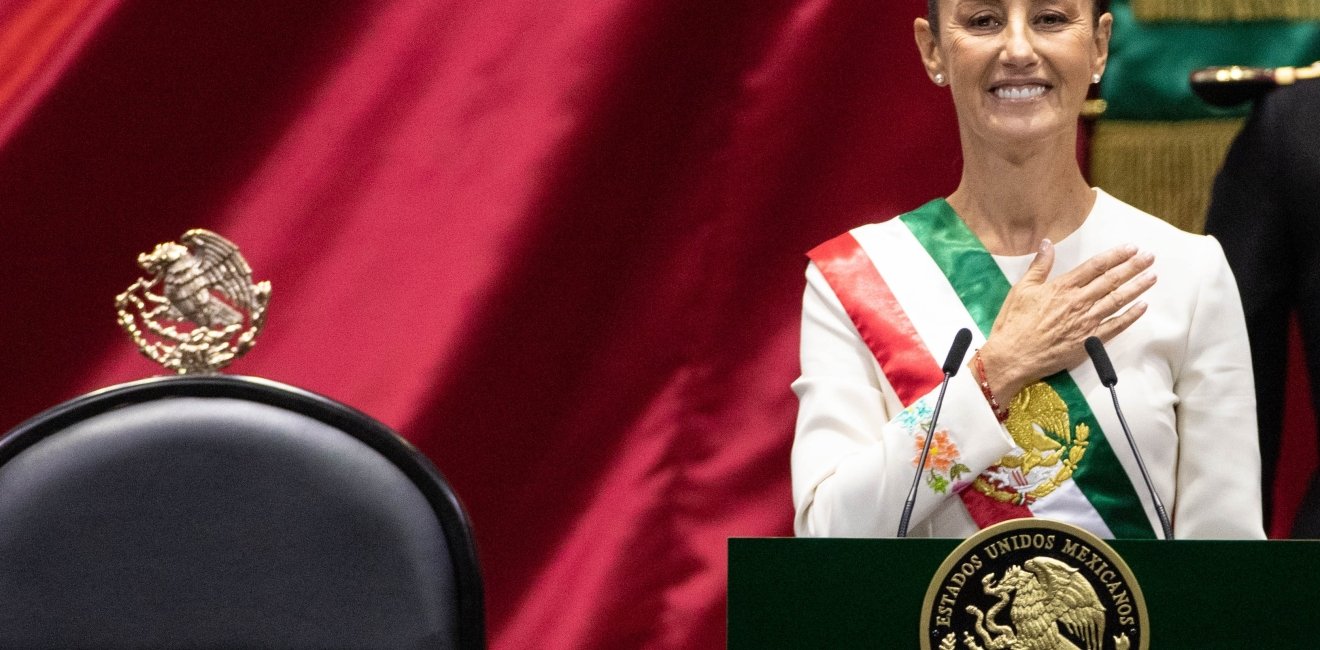The beginning of the Mexican president’s term was busy, to say the least. From reforms to remittances, here’s a look at Claudia Sheinbaum’s kick off.
January 9 marks 100 days since Claudia Sheinbaum’s October 1 inauguration. Assessing a leader after this period, often viewed as a political honeymoon, can seem like arbitrary timing. But, in this case, it’s a good moment to check in after a hectic fall of constitutional reforms and as the country girds itself for the incoming Trump administration’s plans for massive deportations and tariffs that could put Mexico in the crosshairs.
As we ready for 2025, here are three numbers to understand the start of Sheinbaum’s presidency.
78%. Sheinbaum’s approval level, per the latest El Financiero poll, marking the highest level out of her first three months in office. Some 36% of those polled said her government is better than they expected, and she gets high marks for her handling of the economy and social benefits (66%, 79% approval respectively). But only 30% approve of her handling of corruption and just 23% score her well when it comes to managing organized crime woes. Overall, 68% of Mexicans consider public security the country’s top concern, well ahead of the economy or corruption (each at 10%). Homicides averaged 82 per day in October and November, marking a 5.7% increase over the same period a year earlier.
16. The number of constitutional reforms approved in 3.5 months by Mexico’s new Congress, where Sheinbaum’s Morena coalition dominates in both chambers. Granted, the legislature was sworn in a month before Sheinbaum took office and 13 of the 16 reforms were mandates handed down by Andrés Manuel López Obrador, Sheinbaum’s political mentor and Morena’s father figure. Still, it’s the new government that has to handle the implementation and impact of these reforms, including a complete judicial overhaul that involves an unprecedented nationwide election of Supreme Court justices and federal magistrates in June. Other measures ranged from a vaping ban to animal-cruelty prevention to the shuttering of Mexico’s autonomous transparency agency. For her part, Sheinbaum introduced reforms of her own to promote substantive gender equality and expanded powers for the public security secretariat, headed by her close ally Omar García Harfuch.
4.9 million. That’s the estimated number of families in Mexico who benefited from remittances in November 2024. All told, Mexican households received US$5.4 billion in cash sent home that month, marking a 10.6% percent increase over the same period a year prior. 2024 is expected to be a historically high remittance year; though numbers for December are not yet available, Mexicans received a record-breaking $59.5 billion in the first 11 months of the year. It’s possible that migrants sent home more cash amid concerns the incoming Trump government will escalate deportations and could tax remittances; the number of transactions jumped 7.6% during the same month of the U.S. election. But another reason is the depreciation of the Mexican pesoin the second half of the year. Mexico is the world’s second-biggest remittance-receiving country and the cash largely sent home by Mexican migrants accounts is equal to roughly 3.2% of the country’s GDP.
Bonus round (100 days is 3 months y pico, after all): 90,000 MXN pesos. That’s the anticipated price tag—about$4,500 in U.S. dollars—for the cheapest make of an Olinia, Mexico’s line of low-cost electric cars announced January 6 and to be produced through public-private partnerships. The goal is to roll out the line in time for North America’s 2026 World Cup opening match at Azteca Stadium. El País calls Olinia “Sheinbaum’s vochito“ in a reference to the VW bugs built once-upon-a-time in Mexico and which were, for years, an iconic part of the country’s auto landscape. But while vochos added to Mexico City’s infamously bad air quality, the goal is for the Olinia to get to contamination under control: the plan is for the new line to meet EU sustainability goals.
Author

Editor-in-Chief, AS/COA Online, Americas Society/Council of the Americas

Mexico Institute
The Mexico Institute seeks to improve understanding, communication, and cooperation between Mexico and the United States by promoting original research, encouraging public discussion, and proposing policy options for enhancing the bilateral relationship. A binational Advisory Board, chaired by Luis Téllez and Earl Anthony Wayne, oversees the work of the Mexico Institute. Read more

Explore More
Browse Insights & Analysis
Greenland’s New Governing Coalition Signals Consensus

Myanmar’s Junta and the 2026 Elections: A Fig Leaf for Legitimacy?


